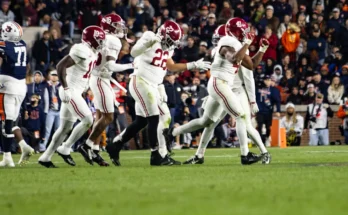MLB Commissioner Rob Manfred Hints At Future Without Traditional Leagues Suggesting Radical Restructuring Of Baseball Could Arrive Sooner Than Many Anticipated
Major League Baseball is a sport rooted in tradition, history, and a deep respect for its past. For more than a century, the league has operated under a system that feels as familiar to fans as the seventh-inning stretch or the crack of a bat against a fastball. Two leagues, the American League and the National League, have served as the backbone of the sport’s identity, each carrying unique distinctions that have shaped rivalries, strategies, and fan culture. Yet, as the landscape of professional sports continues to evolve, MLB commissioner Rob Manfred recently suggested a possibility that would have once seemed unthinkable: a future in which Major League Baseball no longer operates under the traditional league structure.
Manfred’s comments immediately sent ripples across the baseball community, sparking debates among fans, media, and even players about what such a change could mean for the sport’s future. The idea of dissolving or dramatically restructuring the American and National Leagues is not just a matter of shifting scheduling formats or playoff seeding—it represents a fundamental reimagining of how professional baseball organizes itself. For decades, the distinction between the two leagues was central to MLB’s identity, with each league maintaining its own president, its own umpiring crews, and its own stylistic quirks. Even today, after decades of gradual integration and standardization, the historical echoes remain powerful. To hear the commissioner openly suggest doing away with leagues altogether was nothing short of groundbreaking.
At the heart of Manfred’s remarks is the idea that modern professional sports must be flexible, adaptive, and willing to consider bold structural changes to stay competitive in the broader entertainment industry. Baseball is no longer just competing against football, basketball, or hockey for fans’ attention. It is competing against streaming services, global sports leagues, video games, and the endless distractions of digital media. In that environment, tradition alone cannot guarantee sustainability. MLB must constantly look for ways to modernize the fan experience, expand its reach, and create a product that resonates with younger audiences.
To understand why this conversation is happening now, one must consider the trajectory of the league in recent decades. The distinction between the American and National Leagues has already been softened considerably. The introduction of interleague play in 1997 was a major turning point, allowing fans to see matchups that previously occurred only in the World Series. Initially treated as a novelty, interleague play has since become so normalized that it is now woven seamlessly into the schedule. Furthermore, the implementation of the universal designated hitter in 2022 erased one of the last great dividing lines between the two leagues. Once upon a time, strategy in the National League revolved heavily around pitchers hitting, double switches, and bench management, while the American League thrived on designated hitters and higher-scoring lineups. With that difference gone, the two leagues feel more unified than ever before.
It is not difficult to imagine Manfred and MLB’s leadership asking themselves whether the league distinction still serves a meaningful purpose. From a scheduling standpoint, MLB has already embraced a more balanced format, with every team now playing each other at least once per season. This shift has diminished the sense of separation between leagues and heightened the idea that baseball operates as a single, unified entity. In many ways, the groundwork for eliminating traditional leagues has already been laid; Manfred’s recent comments simply bring the conversation into the open.
Of course, such a dramatic change would not come without controversy. Baseball fans are among the most tradition-minded in all of sports, and the mere suggestion of altering the fabric of the game often sparks fierce resistance. For many, the American and National Leagues are not just administrative divisions but part of the sport’s soul. The history of legendary rivalries—the Yankees and Red Sox in the American League, the Dodgers and Giants in the National League—are deeply tied to the structure of the leagues themselves. While rivalries would undoubtedly persist in a restructured format, some fans fear that eliminating leagues would dilute the historical narratives that have defined the sport for generations.
There is also the question of how a league-less MLB would function. Would the regular season be structured more like the NBA or NFL, with a single, unified table of standings and a playoff format seeded entirely by records? Would divisions remain intact, or would MLB experiment with new regional groupings to reduce travel and emphasize geographic rivalries? Would historical achievements—such as pennants, league titles, and distinctions like batting champions—lose their significance in the process? These are the types of questions fans and analysts are already debating in response to Manfred’s comments, and the answers are anything but straightforward.
Still, it is worth noting that professional sports leagues around the world have long experimented with formats that diverge from tradition. European soccer, for example, thrives under systems that often ignore rigid league divisions, instead emphasizing promotion, relegation, and continental tournaments. While MLB is unlikely to adopt such radical systems, the willingness to rethink structure is not unique to baseball. Even within North American sports, leagues like the NBA and NHL have frequently restructured their playoff formats and divisional alignments to better suit modern demands. Baseball, once resistant to change, may simply be catching up to a broader trend of adaptability.
From a business perspective, the idea of eliminating leagues could open new doors for MLB. A unified structure could make scheduling more flexible, create opportunities for innovative broadcast packages, and allow for fresh approaches to postseason matchups. Imagine a scenario in which the two best teams in the league meet in the World Series, regardless of historical league affiliation. Fans would be guaranteed the most competitive championship possible, and matchups that previously would have been impossible—such as two American League powerhouses battling for the title—could suddenly become reality.
Yet, the push for modernization must always contend with baseball’s deeply rooted sense of nostalgia. Generations of fans have grown up cherishing the quirks and distinctions of the American and National Leagues. The notion of league pride has fueled countless debates, shaped strategies, and influenced the way the game has been played. Even if many of those distinctions have faded over time, the emotional connection remains powerful. Manfred’s willingness to broach the subject suggests that MLB leadership is aware of both the potential opportunities and the risks involved. Any move to eliminate leagues would require careful communication, respect for history, and a clear vision for what the future of baseball would look like.
It is also important to recognize that Manfred’s comments do not necessarily signal an imminent overhaul. Instead, they may reflect a willingness to think out loud about long-term possibilities. Sports commissioners often float ideas publicly to gauge reaction before taking concrete action, and this may be another example of that strategy. By mentioning the possibility of eliminating leagues, Manfred invites discussion and allows stakeholders—fans, players, team owners, and broadcasters—to weigh in. If the backlash is overwhelming, the idea may be shelved. If the response is more open-minded, MLB may continue exploring the concept.
The timing of these comments is also telling. Baseball is in the midst of significant transformation, with recent rule changes such as the pitch clock, larger bases, and restrictions on defensive shifts already reshaping the on-field product. These changes have been designed to make the game faster, more exciting, and more appealing to younger audiences. For the most part, they have been well-received, demonstrating that even a tradition-rich sport like baseball can evolve without losing its identity. In this context, the notion of eliminating leagues feels less radical than it might have a decade ago.
For players, the impact of such a shift would be substantial. Scheduling, travel, postseason qualification, and even individual awards could all be affected. Some players might welcome the chance to play every team more frequently and to have their performance evaluated within a single competitive structure. Others might worry about the erosion of tradition and the potential loss of honors that have long carried special significance. For instance, would the concept of league-specific All-Star teams survive, or would the Midsummer Classic need to be completely reinvented? These are not small questions, and resolving them would require extensive consultation with the players’ union.
For fans, the adjustment would be equally significant. Some would embrace the change, excited by the prospect of fresh matchups, a more balanced competition, and a modernized postseason. Others would resist, fearing that baseball would lose part of what makes it unique compared to other sports. Ultimately, fan acceptance would likely determine whether the idea succeeds or fails. Baseball’s leaders know that the sport thrives on its connection to its audience, and any major restructuring must honor that relationship.
Looking ahead, it is clear that baseball is at a crossroads. The sport has shown in recent years that it is willing to embrace innovation while still respecting tradition. Manfred’s comments about the possible end of traditional leagues may not mark the beginning of immediate change, but they do signal a broader willingness to reimagine what MLB could look like in the years to come. For a sport often accused of being too slow to evolve, even the act of entertaining such a conversation is significant.
As baseball continues to balance its reverence for history with the demands of the modern sports and entertainment landscape, the question of whether leagues are essential will remain in the spotlight. The American and National Leagues may survive for decades to come, cherished as symbols of the game’s storied past. Or they may eventually give way to a new vision of baseball, one that prioritizes flexibility, competition, and global appeal over rigid tradition. Either way, the conversation sparked by Manfred’s comments ensures that baseball’s future will remain a subject of passionate debate—and that fans will continue to care deeply about the direction the game takes.
For now, the leagues remain intact, the rivalries remain fierce, and the traditions remain celebrated. But the fact that the commissioner of baseball has openly suggested a world without leagues is enough to remind us all that change is always on the horizon. In baseball, as in life, nothing stays the same forever.



